MICHIGAN COUNTRY LINES



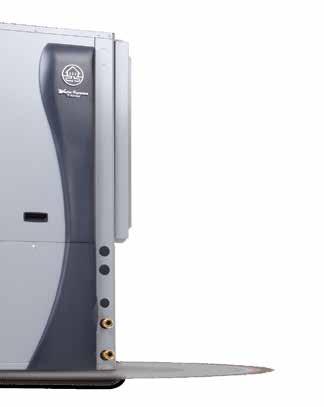





You may not realize it, but you’re sitting on a free and renewable supply of energy. A WaterFurnace geothermal comfort system taps into the stored solar energy in your own backyard to provide savings of up to 70% on heating, cooling, and hot water with a comfort you have to experience to believe. Contact your local WaterFurnace dealer today to learn more about how geothermal can be a game changer for your home.
YOUR LOCAL WATERFURNACE DEALERS
Allendale Allendale Htg & Clg (800) 327-1937 allendaleheating.com
Berrien Springs WaterFurnace Michiana (269) 473-5667 gogreenmichgeo thermal.com
Big Rapids Stratz Htg & Clg, Inc. (231) 796-3717 stratzgeocomfort.com
Filion/Bad Axe
Air-O-Dynamic Htg & Clg (989) 582-0137 aod-hvac.com
Grand Rapids
Bel Aire Htg & Clg
1-888-235-2473 belaire.com
Hart Adams Htg & Clg (231) 873-2665 adamsgeothermal-mi.com
Holland G.H.P. Systems Inc. (616) 396-5833 ghpsystems-inc.com
Indian River M&M Plmb & Htg (231) 238-7201 mm-plumbing.com
Lansing
Candor Mechanical (517) 920-0890 candormechanical.com
Michigan Center Comfort 1/Air Serv of Southern Michigan (517) 764-1500 airserv.com/southernmichigan/
Mt Pleasant
Walton Htg & Clg (989) 772-4822 waltonheating.com
Portage
Bel Aire Htg & Clg 1-888-235-2473 belaire.com
Portland ESI Htg & Clg (517) 647-6906 esiheating.com
Sunfield
Mark Woodman Plmb & Htg (517) 886-1138 mwphonline.com
Three Rivers
Bel Aire Htg & Clg 1-888-235-2473 belaire.com
Traverse City
Geofurnace Htg & Clg (231) 943-1000 geofurnace.com
CO-OP REBATE INCENTIVES
Alger Delta Electric: up to $2,000
Cherryland Electric: up to $2,500
Cloverland: up to $6,275
Great Lakes Energy: up to $5,000
Homeworks/Tri-County Electric: up to $4,750
Presque Isle Electric & Gas Co-op: up to $4,750
Thumb Electric: up to $2,000


EXECUTIVE EDITOR: Casey Clark
EDITOR: Christine Dorr
GRAPHIC DESIGNER: Karreen Bird
RECIPE EDITOR: Christin Russman
COPY EDITOR: Yvette Pecha
CONTRIBUTING EDITOR: Emily Haines Lloyd
PUBLISHER: Michigan Electric Cooperative Association
Michigan Country Lines, USPS591-710, is published monthly, except August and December, with periodicals postage paid at Lansing, Mich., and additional offices. It is the official publication of the Michigan Electric Cooperative Association, 201 Townsend St., Suite 900, Lansing, MI 48933.
Subscriptions are authorized for members of Alger Delta, Cherryland, Great Lakes, HomeWorks Tri-County, Midwest Energy & Communications, Ontonagon, Presque Isle, and Thumb electric cooperatives by their boards of directors.
POSTMASTER:
Send all UAA to CFS.
ASSOCIATION OFFICERS:
Chris O’Neill, HomeWorks TriCounty Cooperative, chairman; Gabe Schneider, Cherryland Electric Cooperative, vice chairman; Shaun Lamp, Great Lakes Energy Cooperative, secretary-treasurer; John Kran, president and CEO.
CONTACT US/LETTERS TO EDITOR: Michigan Country Lines 201 Townsend St., Suite 900 Lansing, MI 48933 248-534-7358 editor@countrylines.com
CHANGE OF ADDRESS: Please notify your electric cooperative. See page 4 for contact information.
The appearance of advertising does not constitute an endorsement of the products or services advertised.
MICHIGAN’S ELECTRIC COOPERATIVES
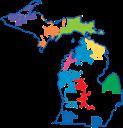
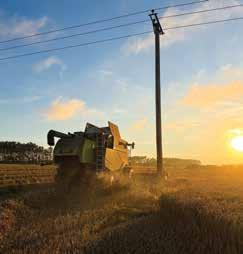


RECIPE CONTEST
See details on page 10. Cozy Bowls, due Nov. 1. Win a $100 bill credit!
GUEST COLUMN
See details on page 18. Share your fondest memories and stories. Win $200 for stories published!
To enter contests, submit reader content & more, visit countrylines.com/community
6 POWER OF CO-OP COMMUNITIES
From the REA to today—the enduring power of connection.
10 MI CO-OP KITCHEN
Fall Favorites: From harvest to home— recipes to fall for.
14 ADAM NIGHTINGALE: SMALL TOWN ROOTS, SPARTAN GLORY
How small-town values shaped a championship culture at Michigan State.
18 GUEST COLUMN
The Best Garage Sale Find: A 1940 Dodge and a lifetime of memories.
BOARD OF DIRECTORS
Gabe Schneider, President 517-449-6453
gschneider@cherrylandelectric.coop
Valarie Handy, Senior Vice President 231-392-4705
vhandy@cherrylandelectric.coop
Melinda Lautner, Secretary 231-947-2509
mlautner@cherrylandelectric.coop
Dean Adams, Treasurer 231-642-0014
dadams@cherrylandelectric.coop
Terry Lautner, Director 231-883-6455
tlautner@cherrylandelectric.coop
David Schweitzer, Director 231-883-5860
dschweitzer@cherrylandelectric.coop
Tom Van Pelt, Director 231-386-5234
tvanpelt@cherrylandelectric.coop
CEO
Rachel Johnson
CO-OP EDITORS:
Courtney Doyle: cdoyle@cherrylandelectric.coop
Bailey Watson: bwatson@cherrylandelectric.coop
OFFICE HOURS
Monday–Friday 7:30 a.m.–4 p.m.
TELEPHONE NUMBERS
231-486-9200 or 1-800-442-8616 (Mich.)
ADDRESS
P.O. Box 298, Grawn, MI 49637
PAY STATION
Cherryland Electric Cooperative office 5930 U.S. 31 South, Grawn MI, 49637
Cherryland Electric Cooperative is an equal opportunity provider and employer.
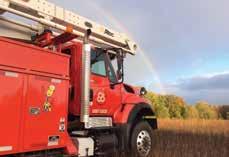
Cherryland is one of over 900 electric cooperatives powering over 20 million American homes, businesses, farms, and schools in 48 states. Thank you to all the co-op members and employees who keep Cherryland and the cooperative tradition alive and well.

Cherryland Cares distributes funds to local nonprofit organizations in need of financial support. The funds distributed by Cherryland Cares are a result of members electing to round up their monthly bills to the nearest dollar. Members can contribute to the Cherryland Cares fund by calling 231-486-9200, signing up through SmartHub, or emailing cec@cherrylandelectric.coop.
If you are an area nonprofit agency seeking financial help, visit cherrylandelectric.coop/cherryland-cares for information on how to apply.
For additional details, please call Shannon Beery at 231-486-9218 or email her at sbeery@cherrylandelectric.coop.

Cherryland members are eligible to receive rebates for energy-efficient upgrades in their homes or businesses. Common upgrades include purchasing ENERGY STAR-qualified appliances or making energy-efficient upgrades.
For a guide to our residential rebate program and a complete listing of rebates available, visit our website at cherrylandelectric.coop/rebates.

Interested in going
Cherryland offers a suite of solar programs designed for those who want to support renewable energy with their cooperative. The suite includes community solar, net metering, and buy-all/ sell-all programs. Whether you want to cover your annual energy costs or use the clean energy you generate, there is a solar program for everyone!
To learn more, visit our website at cherrylandelectric.coop/renewableenergy-programs.
By Rachel Johnson, Cherryland CEO

Rebuilding a power line is never just about poles and wire; it’s about solving a dynamic, high-stakes puzzle. One shaped by weather, terrain, and budget. And it’s a puzzle we’ve gotten really good at figuring out.
Fifty years ago, just 8% of Cherryland’s system was underground. Today, over half of our lines are buried and out of sight. That’s incredibly rare for a rural electric co-op and a big reason why our members experience fewer outages than almost anyone else in Michigan.
That transition didn’t happen by accident—it’s the result of careful analysis of every project we tackle on your behalf.
Our line design team starts with one big, overarching question: What’s the best way to build this so it keeps the lights on for the people who live and work here? We look at logistical factors like tree cover, soil conditions, environmental sensitivities, and even how hard it might be to get equipment into the area.
Some areas lend themselves to overhead construction with their open spaces, easy access, and dry ground. Others practically beg for underground, like spots with lots of trees, steep terrain, or a history of storm-related outages.
And then there’s the cost.
Underground line is two-to-four times more expensive than overhead. That’s not an exaggeration. It’s the difference between building one mile of underground line or three miles of overhead line for the same money. When you’re working with finite dollars while trying to provide the highest quality service possible, that tradeoff becomes very real.
This is especially top of mind for us right now. Every October, we build out our capital budget for the year ahead, and this month, we’re deep into planning for the most impactful system upgrades we can make in 2026. Next year, we’ll invest over $12 million on your behalf in rebuilding parts of our system, replacing outdated equipment, and continuing to deliver the reliable service you count on.
Will we keep going underground in the future? Yes. But never entirely. While we default to underground for new
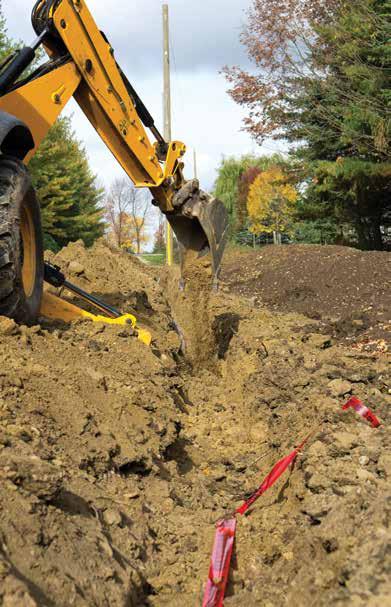
“Our job is to make sure your power works so seamlessly that it fades into the background. But, make no mistake, behind the scenes we’ll keep solving the puzzle with consistent investment and thoughtful planning.”
construction, and we prioritize it for upgrades where it can have the biggest long-term impact, there will always be parts of our system that are too wet, too remote, or too environmentally sensitive for underground work.
You don’t have to see the wires to feel their impact. Our job is to make sure your power works so seamlessly that it fades into the background. But, make no mistake, behind the scenes we’ll keep solving the puzzle with consistent investment and thoughtful planning. And we’ll always have the same guiding goal: Deliver the most reliable power we can, as cost-effectively as we can, to the people who count on us.

To hear more, listen to the Co-op Energy Talk Podcast

By Emily Haines Lloyd
When the Rural Electrification Act (REA) passed in 1936, it did more than bring electric lines to farms—it powered a movement. Built by neighbors for neighbors, electric cooperatives transformed rural life. Nearly 90 years later, that same spirit continues to connect Michigan’s rural communities—not just with electricity, but with tools for resilience, innovation, and opportunity.
This October, during National Cooperative Month, we’re reminded that co-ops are more than utilities—we are community builders. Michigan’s electric cooperatives honor that legacy by ensuring electric reliability and staying rooted in the values that built us: service, commitment, and cooperation.
Keeping the lights on in rural Michigan requires long-term planning and reliable generation. That’s why electric co-ops are investing in system upgrades, new energy resources, and smart technology to meet growing demand and withstand increasingly severe weather.

“Just like we brought power to the countryside nearly a century ago, co-ops are now bringing new and exciting energy options to the places that need it most,” said MECA CEO & President John Kran. “It’s not just about connection—it’s about unlocking potential in every rural home, farm, and business.”

Cooperatives ensure members have the dependable, affordable power they need—whether through traditional sources or renewable projects like solar, wind, and peaking plants. Reliability is the foundation of everything co-ops do, because when the power stays on, rural communities can thrive.
One of the most powerful aspects of the co-op model is that it’s not just a service—it’s a partnership. Co-ops are owned by the members they serve. That means you have a voice in how your co-op is run.
Every member has the right to vote for their board of directors, who set policy and guide decision-making. Even better? Members can run for the board themselves. It’s a grassroots, democratic process that ensures our direction is always grounded in the needs of the community—not outside investors.
Participation is at the heart of the cooperative difference. From attending your annual meeting to serving on the board, your voice helps shape the future of your electric cooperative.
Electric cooperatives are neighbors, partners, and problemsolvers. Every decision same make starts with a simple question: What’s best for our members? That’s why same invest in schools, support scholarships, advocate for rural issues, and work 24/7 to restore power in any conditions.
“Electric co-ops were founded on the idea that we’re stronger together. Every pole we set, every line we run, every investment we make—it all comes back to serving people, not profi ts,” said Kran. “That’s the power of community.”
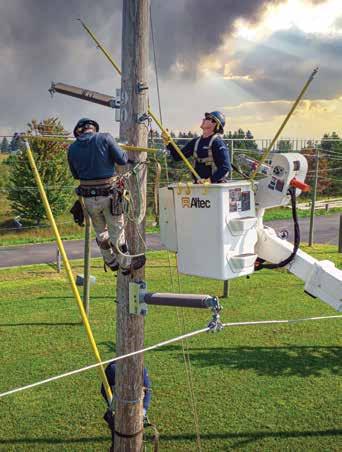
“Electric co-ops were founded on the idea that we’re stronger together. Every pole we set, every line we run, every investment we make—it all comes back to serving people, not profits.”
Michigan co-ops are not alone. We’re part of a national network of 942 electric cooperatives serving more than 42 million people across 56% of the landmass of the United States. That shared strength gives us access to resources, knowledge, and collaboration that help us better serve our nationwide communities—while still maintaining local control.

October is Cybersecurity Awareness Month — here’s how our co-op and our members can team up to protect personal information.
Our employees will always show up in marked Cherryland vehicles.
Don’t let anyone into your home unless it’s been scheduled ahead of time (like an energy audit)
Disconnection notices only come from us by email, letter, or an automated phone call. We do not demand payment over the phone when we contact you. You should always use a known payment channel to make your payment When in doubt, give us a call at 231-486-9200 to double-check — it never hurts to ask.
Update your contact info so we can reach you quickly if needed. Watch for phishing we’ll never ask for your password, SSN or demand payment over email.
Use strong, unique passwords for your online account.
Enable account notifications to spot unusual activity
Keep software & devices updated.
This October, join us in making cybersecurity a priority. Together, we can keep your information—and our cooperative—safe.

Our team bought two pigs at the livestock auction, raised by our own members, Kendall Loomis, daughter of Brent and Andrea Loomis, and Wyatt Widrig, son of Rob and Angie Widrig. Those pigs went on to do some good, as they were donated to Goodwill’s Food Rescue. Hats off to Kendall and Wyatt for raising such fine pigs!
Besides the auction fun, Cherryland sponsored the pancake breakfast, where our folks volunteered to flip pancakes and serve sausage. And let’s not forget our favorite—sponsoring Kid’s and Special Kid’s Day, where we got to toss bean bags and win prizes with the kiddos!
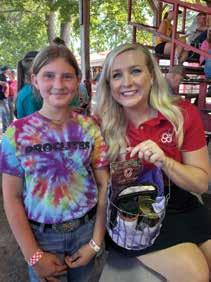
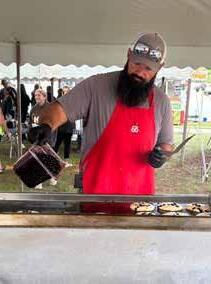
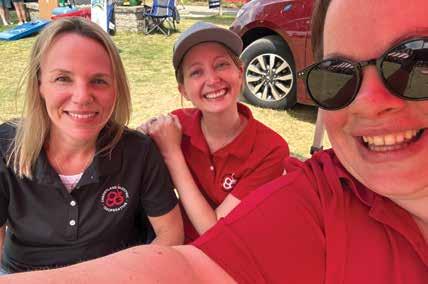
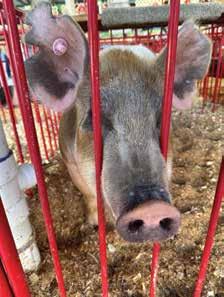
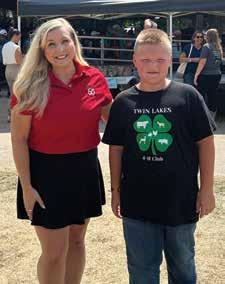
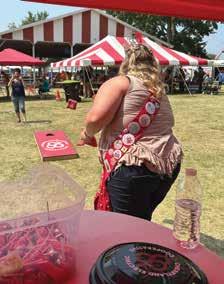

RECIPE CONTEST Win a $100 energy bill credit!
Cozy Bowls, due Nov. 1. Submit your favorite recipe for a chance to win a $100 bill credit and have your recipe featured in Country Lines with a photo and a video. Submit your recipe at micoopkitchen.com, or send it via email (include your full name and co-op) to recipes@countrylines.com.
MUFFINS WITH MAPLE CREAM
Phil Ehardt, Great Lakes Energy
MUFFINS:
3 large eggs
1 (15-ounce) can pumpkin puree/canned pumpkin
½ cup neutral fl avored oil, like canola, vegetable, avocado
½ cup unsweetened applesauce
1 cup granulated sugar
2½ cups all-purpose fl our
2 teaspoons pumpkin pie spice
1 teaspoon baking soda
½ teaspoon baking powder
½ teaspoon salt
GLAZE:
1 cup powdered sugar
2–4 tablespoons heavy cream
½ teaspoon maple extract
Preheat the oven to 375 F. Line two standard muffi n tins with paper liners and set aside (24 muffi ns total). In a large bowl, whisk together the eggs, pumpkin, oil, applesauce, and sugar.
In a separate bowl, stir together the fl our, pumpkin pie spice, baking soda, baking powder, and salt. Add the dry ingredients to the wet ingredients and mix until just combined (don’t overmix or the muffi ns may be dense/heavy). Divide the batter evenly among the prepared muffi n tins, filling the cups about ⅔ full (or slightly more). You can use a cookie scoop to portion the batter into the muffi n tin. Bake for 15–20 minutes until the top of the muffi ns spring back to the touch and/or a toothpick inserted in the center of a muffi n comes out clean or with a few moist crumbs attached. Remove the muffi ns from the muffi n tin to a cooling rack to cool completely. For the glaze, whisk together the glaze ingredients, starting with the lesser amount of heavy cream and adding more as needed to make a pourable, but still thick, glaze. Drizzle the glaze over the cooled muffi ns with a spoon or fork and serve.
Watch a video of this month’s winning recipe at micoopkitchen.com/videos




Karla Oosting, Great Lakes Energy
2 pounds boneless, skinless chicken breasts
16 ounces Olive Garden Signature Italian Dressing (or favorite Italian dressing)
½ cup shredded Italian cheese
¼ teaspoon black pepper
8 ounces cream cheese
16 ounces penne pasta
½ cup Parmesan cheese
Add chicken breasts to slow cooker. Pour in the Italian dressing and sprinkle with cheese and black pepper. Place cream cheese on top. Cover. Cook on high for 4 hours or low for 5–6 hours. About 10–15 minutes before the cooking time is done, start cooking the pasta according to the package directions; drain well. Shred the chicken with 2 forks. Then add the pasta to the slow cooker and stir. Sprinkle with Parmesan cheese. Enjoy!
Mary Ellen Wynes, HomeWorks Tri-County
1 ready-made pie crust
1 teaspoon fl our
½ cup sugar
1 teaspoon cinnamon
½ teaspoon salt
¼ teaspoon ground cloves
1 (16-ounce) can (2 cups) pure pumpkin puree
1 (5-ounce) can evaporated milk
2 eggs, beaten
1 (8-ounce) container whipped topping, divided
½ cup chopped pecans
½ cup sour cream
Preheat oven to 425 F. Prepare pie crust according to package directions. In a large bowl, combine fl our, sugar, cinnamon, salt, cloves, pumpkin, evaporated milk, and eggs. Mix well. Fold in 1½ cups whipped cream (reserve remaining for topping) and pecans; stir. Pour into crust. Bake for 15 minutes. Reduce the oven temperature to 350 F and continue baking for 40–45 minutes or until a knife inserted in the center comes out clean. Cool. In a small bowl, fold the sour cream into remaining whipped topping. Dollop on the cooled pie.
Gary Geyer, Presque Isle Gas & Electric
3 pounds ground chuck
2 (14-ounce) cans kidney beans, liquid reserved
2 (14-ounce) cans pinto beans, liquid reserved
2 (14-ounce) cans black beans, liquid reserved
2 medium onions, diced
2 green bell peppers, diced
1 bunch celery, thinly sliced
2 (4-ounce) cans diced green chilies
1 (28-ounce) can diced tomatoes
1 (14-ounce) can diced tomatoes, chili ready
2 cups water
2 (14½-ounce) cans tomato sauce
3 tablespoons chili powder + 1 teaspoon chili powder, divided
1 tablespoon freshly ground black pepper
1 tablespoon garlic powder
2 tablespoons cumin
½ teaspoon seasoning salt
1–2 sliced jalapeños (for spicier chili)
• Optional toppings: shredded cheese, diced green onions, fi nely diced onions, crackers, sour cream
In a large pot, cook the ground chuck until no longer pink. Drain excess fat. Add only the liquid from the cans of beans (setting the beans aside). Then add the onions, peppers, celery, green chilies, diced tomatoes, water, tomato sauce, chili powder, pepper, garlic, cumin, seasoning salt, and jalapeños (if desired). Stir and cook on high for 20 minutes, stirring often. Then reduce to a simmer for 2 hours while stirring occasionally to prevent sticking/burning. After 2 hours of simmering and stirring, stir in all the beans. If too thick, add small amounts of water and simmer another 10–15 minutes. Serve with optional toppings, if desired.
Every October, we tip our hats to National Cooperative Month, shining a light on what it means to be an electrical cooperative. Here in northern Michigan, we’re blessed with a variety of businesses that have embraced the cooperative way, and we’re excited to celebrate them! On this page, you’ll discover local cooperatives in our community and maybe even find a new one to support. As members of Cherryland Electric Cooperative, you know the perks of being part of a member-owned cooperative, so why not spread that love to other areas too?
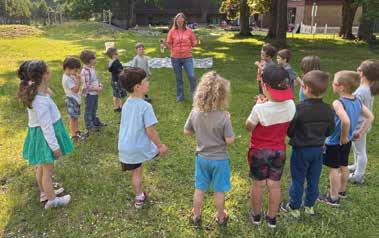


Traverse City Cooperative Preschool is a warm, playbased learning community where children grow through exploration, creativity, and connection. In our cooperative model, parents take an active role in the classroom, creating a tight-knit community, lowering tuition costs, and allowing for more individualized attention. This partnership between families and the school not only enriches the learning environment but also models the value of working together for our children.
MI Farm Co-op unites over 25 Northwest Michigan family farms to keep fresh, local food accessible, ensure fair prices for farmers, and strengthen the regional food system. Founded in 2014, the co-op streamlines marketing, delivery, and wholesale logistics so farmers can focus on growing. One order brings together eggs, vegetables, meats, and more from multiple farms, delivered directly to restaurants and schools through our Community Sponsored Agriculture. We love the cooperative model because farmers retain ownership and control, working together to lower costs, reduce environmental impact, and build a stronger local economy—all while connecting the community to fresh, seasonal, and sustainably grown food.
Rooted in Traverse City since 1973, Oryana Community Co-op is a vibrant, community-owned grocery store dedicated to providing fresh, organic, and locally sourced food. With a strong commitment to sustainability, cooperative values, and delicious food, Oryana offers everything from everyday pantry staples to specialty wellness products. The co-op supports local farmers and producers, promotes environmental stewardship, and fosters a welcoming space where everyone from longtime members to curious newcomers can shop with purpose. Whether you’re looking for organic produce, wholesome meals, or a sense of community, Oryana is more than just a grocery store—it’s a hub for our regional food economy and shared values.

By Emily Haines Lloyd
Before the trophies and roaring Munn Ice Arena crowds, Adam Nightingale’s hockey world was a frozen pond in Cheboygan, Michigan. Skates laced tight, cheeks stung red by the winter air, he and his brothers battled for bragging rights. It was there, on that rough northern ice, that he learned lessons he still carries as Michigan State University’s head coach—chief among them, that “hockey is what you do, it’s not who you are.”
In Cheboygan, effort mattered more than accolades, and how you treated people mattered most of all. Today, Nightingale blends that smalltown humility with championship-level ambition, shaping both a winning program and the young men who play for it.
Sports were a family affair. Nightingale’s parents, both athletes themselves, raised their children with competitive spirits, and sports were a part of everyday life. So much so, all three Nightingale brothers have found their way to careers in sports—specifically, hockey. Adam’s older brother, Jason, is the Buffalo Sabres’ assistant director of
amateur scouting, and his younger brother, Jared, played professionally for nearly 10 years and now coaches for the Rockford IceHogs, an affiliate team for the Chicago Blackhawks. But for the Nightingale boys, the focus was never really about reaching the pros. “We were definitely competitive kids,” said Nightingale. “But our parents emphasized doing our best, treating people right, and finding what we were passionate about.”
Nightingale followed his passion for hockey to Lake Superior State University before transferring to Michigan State University for two years.
Wearing the Spartan jersey was more than an athletic milestone; it was almost prophetic. Years later, returning as head coach at MSU was a fullcircle moment.
Nightingale was hired in 2022, inheriting a hockey program that had won only 12 games the previous season.
In just his second season as head coach, Nightingale guided MSU to both the Big Ten

regular-season and tournament championships— the fi rst time in program history that the team captured both titles in the same year. He also earned 2024 Big Ten Coach of the Year honors. Still, he’s quick to share the credit. “We’ve got great players, great staff, great people. Championships are a team effort,” he said.
Coaching wasn’t part of a grand plan. After graduating from college and four seasons in the minors, with his fi rst child on the way, Nightingale left the game for a job with a construction company to secure health insurance. But the pull of the rink never faded.
He began teaching economics and coaching hockey at a boarding school, where he discovered the deep satisfaction of mentoring young athletes.
“Coaching is about relationships,” said Nightingale. “I’ve been the guy on the power play, and I’ve been the guy not on the ice when we’re one goal down. Part of coaching is getting your players to see the value of every role.”
Nightingale’s approach to coaching is steeped in the values of rural Michigan—humility, resilience, and community. “There’s a humility in northern Michigan,” he said. “It’s never about your job title or money. It’s about how you treat people.”
Growing up in a small town also meant accountability. “If you want something, you have to work for it,” he said. “There’s a little bit of a chip on your shoulder. Which I think can be a positive thing for an athlete.”
That mentality resonates with his current Spartan players, fostering a culture of competitiveness and continuous improvement. “When something doesn’t go our way, we fi gure out why and get better,” he said.
Now, behind the bench at Munn Ice Arena, Nightingale carries both the tradition of Spartan hockey and the lessons learned on Cheboygan ice.
When the noise of the season fades and the ice lies quiet again, it’s easy to see how that boy from Cheboygan grew into a coach who still plays for all the right reasons.
“Being here,” Nightingale said, “just feels like right.”

I’ve been the guy on the power play, and I’ve been the guy not on the ice when we’re one goal down. Part of coaching is getting your players to see the value of every role.” “


August 2025
• The board of directors approved the cooperative’s three-year Impact Plan. This plan outlines cooperative objectives for six key focus areas: Data Analytics, Equity & Financial Management, Rate Design, Member Experience, AI, and New Facilities.
• The chief financial officer presented the 2024 key ratio trend analysis. These ratios compare Cherryland to other electric utilities of similar size in the state and across the U.S.
• The board received a reminder that the office will resume traditional hours of 7:30 a.m.–4 p.m., Monday through Friday, starting Sept. 2.
This hunting season, we encourage all members to be aware of electrical equipment and take necessary precautions while hunting. Keep these safety tips in mind as you enjoy the great outdoors.
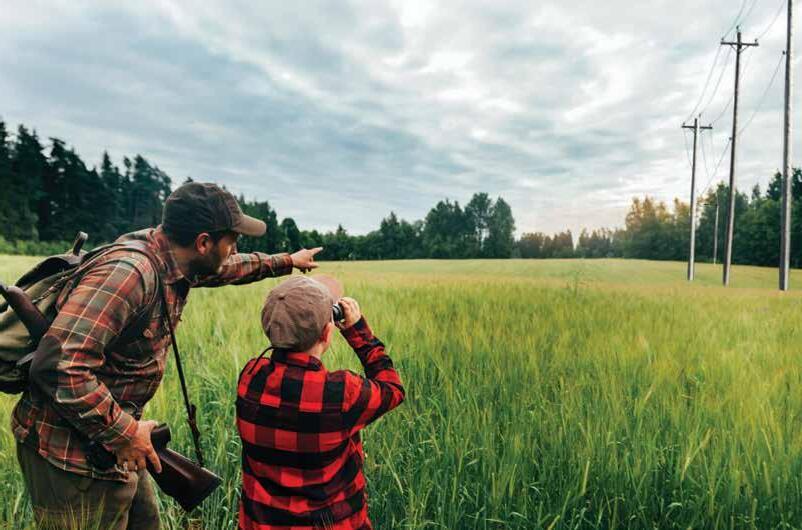
1. Take notice of posted warning signs and keep clear of electrical equipment.
2. Do not shoot at or near power lines or insulators.
3. Know where power lines and equipment are located on the land where you hunt.
4. Be especially careful in wooded areas where power lines may not be as visible.
5. Do not place deer stands on utility poles or climb poles. Energized lines and equipment can conduct electricity to anyone who comes in contact with them, causing shock or electrocution.
6. Do not place decoys on power lines or other utility equipment. Any nonelectrical equipment attached to a pole can pose an obstruction and serious hazard to our line crews.






1. MOST VOTES “Mackinac Bridge”—Robert Lenox
2. “Lost in nature’s embrace, where the bridge stands as a silent sentinel, untouched by the world’s frenetic pace. Potagannissing River, Drummond Island”
Dakota Grant
3. “Boardwalk bridge” Sue Rehmann
4. Mindy Garvin
5. “Footbridge over Fanny Hooe Creek, Copper Harbor, MI” Joel Wegman
6. “Manistee. Pere Marquette Railroad, north end of Manistee Lake.”—Michael McCann
Enter
Submit Your “Seasonal Beauty” Photos By Oct.25! Submit your best photo and encourage your friends to vote! The photo receiving the most votes in our Facebook contest will be printed in an issue of Country Lines, along with some of our other favorites. Our October theme is “Seasonal Beauty”! Photos can be submitted through Oct. 25 to be featured in our January issue.
Enter Your Photos And Win A Bill Credit! To enter the contest, visit cherrylandelectric.coop/ photo-contest or visit facebook. com/cherrylandelectriccoop for a link to the current photo contest. Enter your picture, cast your vote, and encourage others to vote for you as well. If your photo is printed in Country Lines during 2026, you will be entered to win a credit of up to $200 on your December 2026 bill.
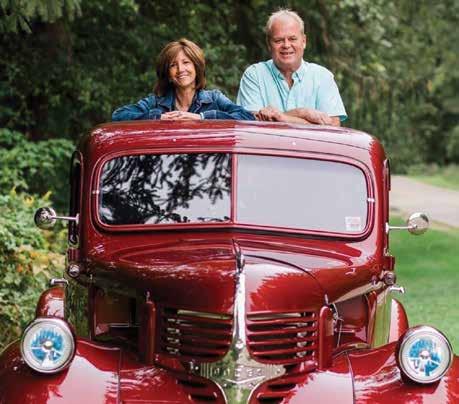
By Catherine Drager, a HomeWorks Tri-County Electric Cooperative member
I was driving past a garage sale one day and spotted an old dresser in the driveway. Short on time, I didn’t stop. I asked my husband Marvin to check it out the next day to see if it was something I could refi nish for the grandchildren’s bedroom. He stopped at the garage sale but came home and told me that he bought a truck. Puzzled, I said to him that I didn’t see a truck for sale there, and he told me the owner had a 1940 Dodge truck, all in pieces, in the garage and on the rafters, that he never got around to putting together and restoring.
Needless to say, those pieces came home with him. He worked on it in his spare time, between running his business and visiting our cabin in Farwell. He dedicated more time to it once our son was getting married at the Packard Proving Grounds in Shelby
Township in May of 2016. You could have one of their classic Packard cars to display at the reception, or bring in your own classic vehicle. The Dodge wasn’t completed at that point, but we were happy to use our late brother-inlaw’s 1930 Model A for the wedding.
The truck was completed shortly after, and my husband enjoyed taking it to the Downriver and Woodward Dream Cruises and car shows, and driving it around town. He even put a lap belt in it for me so that I didn’t bounce around on the bench seat. Many family members and friends enjoyed rides in the truck, and he loved sharing the stories of searching for the parts and the challenge of putting it all together. Marvin passed in 2021, but I am grateful he never checked out that old dresser, but was able to enjoy his best garage sale “fi nd.”
“Many family members and friends enjoyed rides in the truck, and he loved sharing the stories of searching for the parts and the challenge of putting it all together.”
GUEST COLUMN Win $200 for stories published! Share your fondest memories and stories. Win $200 for stories published. Visit countrylines.com/community to submit.



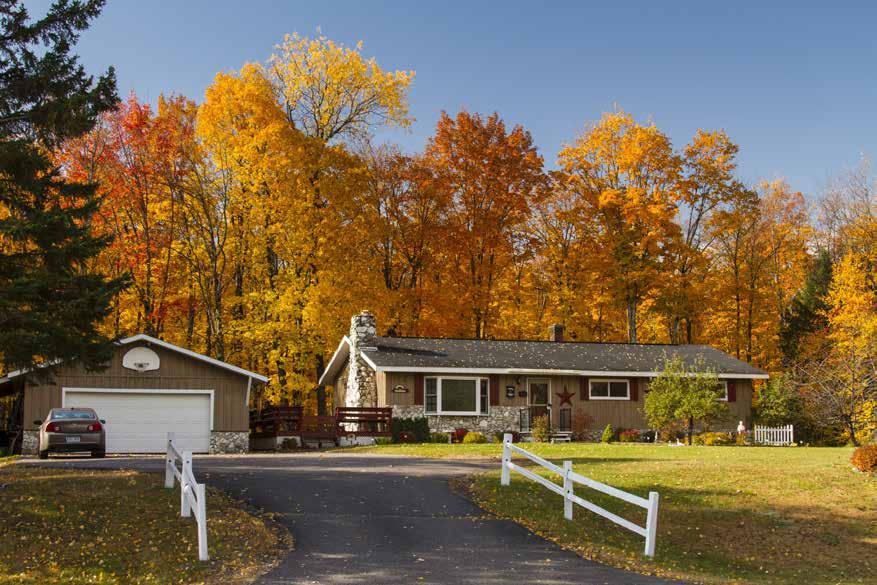

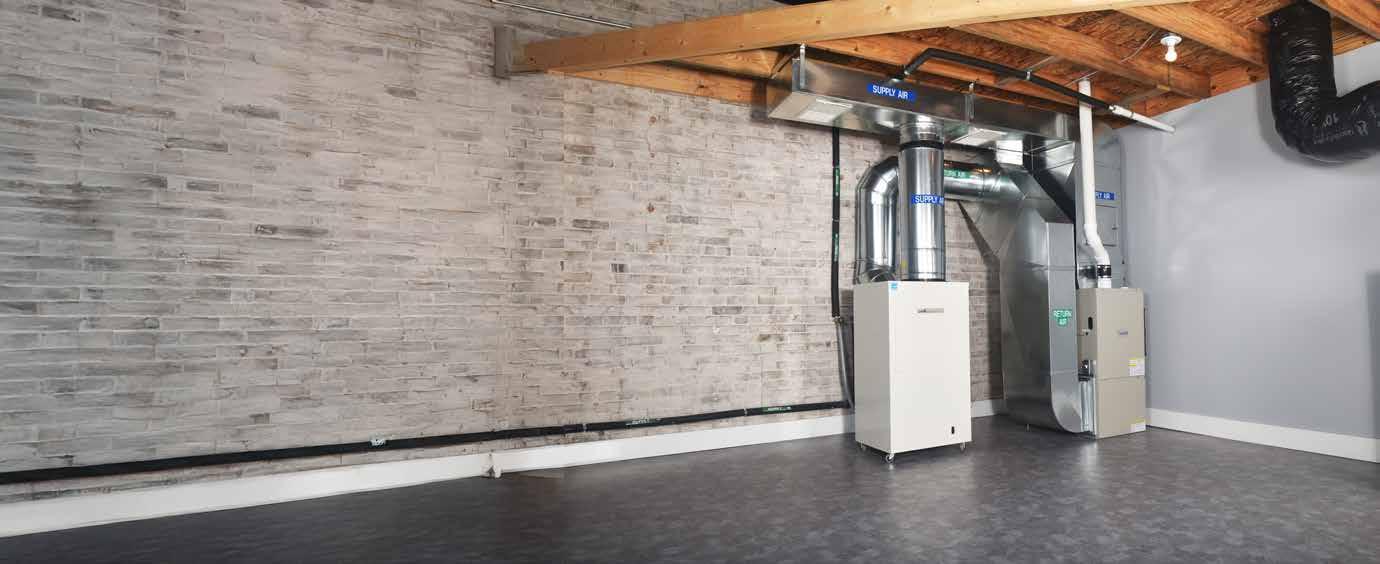

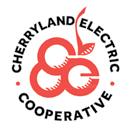

Electric cooperatives are not-for-profit, community-led utilities. Because we are a co-op, we can adapt to our local members’ needs, providing the programs and services you care about most.
That’s the power of co-op membership.